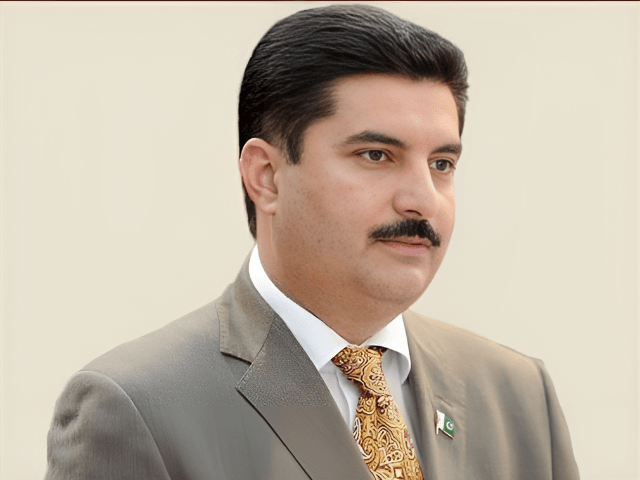Islamabad:
With the tide apparently revolving after the verdict in the reserved seats, the governor of Khyber-Pakhtunkhwa, Faisal Karim Kundi, has entered into action, intensifying the efforts to rough the government led by PTI in the province.
The measure is part of a plan larger than Prime Minister Shehbaz Sharif, who, according to the reports, had given Kundi the reins to orchestrate a political shaking in the province.
The ruling of the reserved seats has given the Federal Coalition a foot at the door of the KP Assembly, feeding speculation that an impulse without confidence may not be far away.
Within the rows of the government, there is a growing consensus that the control of a decade of PTI on Khyber-Pakhtunkhwa has followed its course and that recent developments have further exposed their inability to guarantee public safety.
In the midst of this backdrop, Governor Kundi met with the president of PPP, Bilawal Bhutto Zardari, to take stock of the political landscape and security scenario.
During the meeting, the governor informed Bilawal about recent developments, including his commitment to legislators of the coalition parties and the implications of the allocation of reserved seats.
The deterioration of the situation of the law and order, especially in the southern districts of KP, appeared prominently in their discussions.
Kundi informed the president of PPP of growing security concerns and the administrative obstacles they face in the province.
He also provided a detailed description of the recent human tragedy on Swat, where sudden floods charged several lives, and criticized the response of the provincial government as extremely inappropriate.
Referring to help activities, said the governor: “According to their instructions, I visited the affected families in Daska and Rustam, Mardan.”
Al Jazeera interview
The former Foreign Minister and president of PPP, Bilawal Bhutto Zardari, in an interview with Al Jazeera, warned that the increasingly aggressive antipakistan narrative in India represented a threat not only for Pakistan but with India itself.
He argued that New Delhi was trying to globalize a hostile ideology that risked to destabilize the region. “This new ideology is dangerous for both Pakistani,” he said.
Rejecting the accusations of Pakistan’s participation in terrorist incidents on the border, Bilawal added: “Pakistan did not participate in terrorist attacks in India.”
He said the country faced the growing incidents of terrorism daily.
Hafiz Saeed, Masood Azhar
Bilawal also pointed out the opening of Islamabad to consider extradite the boss of Laskhar-E-Taiba (Let) Hafiz Saeed and the chief of Jaish-E-Muhammad (Jem) Masood Azhar, provided that India cooperates in facilitating judicial procedures.
“As part of an integral dialogue with Pakistan, where terrorism is one of the issues we discuss, I am sure that Pakistan would not oppose any of these things.”
According to the National Terrorism Authority of Pakistan (NACTA), both Let and Jem are prohibited organizations. Currently, Saeed is serving a 33 -year sentence in Pakistan for the financing of terrorists, while Azhar has also been banned by the authorities.
Bilawal explained that existing legal actions against the two people have focused on the positions presented within the Jurisdiction of Pakistan.
However, he pointed out that prosecuting them in accusations of cross -border terrorism remained a challenge due to the reluctance of India to follow the basic procedure requirements.
“India is refusing to meet certain basic elements that require that the conviction take place,” he explained.
“It is important: to present evidence within these courts, so that people come from India to testify, to support any of the counteracusions.
The PPP leader also fell strongly against India’s position on cross -border terrorism, characterizing it as a dangerous change in regional norms.
“The new normality or the new abnormal that India would like to impose in the subcontinent, is that any terrorist attack within India means war with Pakistan,” Bilawal said.
“This does not serve the interests of Pakistan, and it does not serve the interests of India.”
He then warned that this logical climbing placed the fate of almost two billion people in the hands of non -state actors.
“Two nuclear weapons countries have reached the point that they have reduced the threshold for military conflict, to this level, which in effect means that we leave the destination of 1.7 billion people who are not in the hands of the Pakistani or Indian government, but to non -state actors without face and faceless.”
When asked specifically about the current state of Saeed and Azhar, Bilawal clarified: “In fact, it is not correct that Hafiz Saeed is a free man; he is under the custody of the Pakistani state.”
He added that Azhar’s whereabouts still are clear, but stressed that Islamabad believes that it is out of the country. “We believe he is in Afghanistan,” he said.
“If the Indian government shares information that it is on Pakistani soil, we will be more than happy to arrest it.”




